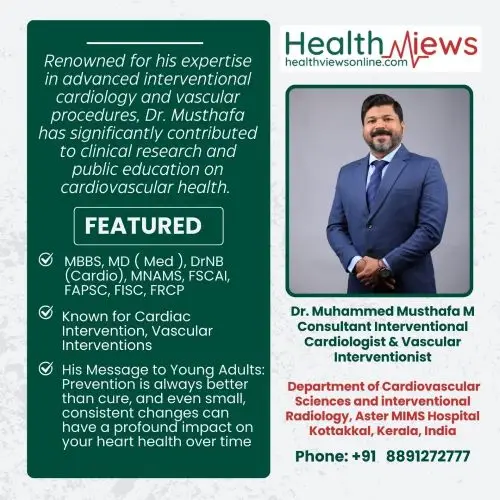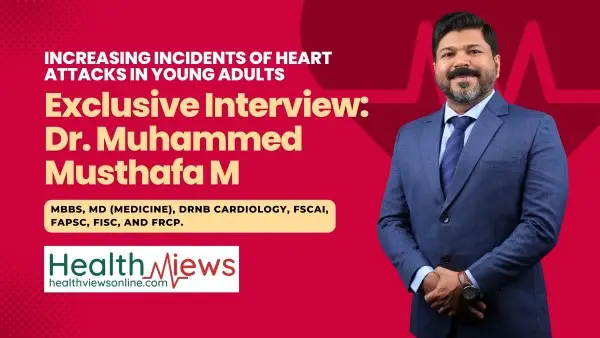Dr. Muhammed Musthafa M is a highly regarded Consultant Interventional Cardiologist and Vascular Interventionist at the Department of Cardiovascular Sciences and Interventional Radiology, Aster MIMS Hospital, Kottakkal, Kerala.
With a stellar academic background, he holds an MBBS and MD (Medicine), along with a DrNB in Cardiology. Dr. Musthafa is a Fellow of the Society for Cardiovascular Angiography and Interventions (FSCAI), the Asia-Pacific Society of Cardiology (FAPSC), the Indian Society of Cardiology (FISC), and the Royal College of Physicians (FRCP). Renowned for his expertise in advanced interventional cardiology and vascular procedures, Dr. Musthafa has significantly contributed to clinical research and public education on cardiovascular health.
In this exclusive HealthViews interview, Dr. Musthafa sheds light on the increasing prevalence of heart attacks among young adults and shares valuable insights on prevention, diagnostics, and advancements in cardiology.
Q1. Why are we seeing a rising trend of heart attacks in young individuals?
Dr. Musthafa: Several factors contribute to this alarming trend. Lifestyle changes, including poor dietary habits, lack of exercise, and increased stress levels, play a major role. Additionally, the rising prevalence of smoking, substance abuse, and early onset of diabetes and hypertension are significant contributors. Genetic predisposition also cannot be ignored.
Q2. How much of a role does stress play in triggering heart attacks in young people?
Dr. Musthafa: Stress is a silent killer. Chronic stress leads to increased secretion of stress hormones like cortisol and adrenaline, which can raise blood pressure, elevate cholesterol levels, and promote arterial inflammation. These are precursors to heart disease, even in the absence of traditional risk factors.
Q3. What are the lesser-known risk factors contributing to heart attacks in young individuals that often go unnoticed?
Dr. Musthafa: Many people focus on traditional factors like smoking or cholesterol, but other risks like sleep apnea, chronic inflammation, sedentary screen-heavy lifestyles, and even mental health disorders such as depression and anxiety play significant roles. These are often overlooked during routine checkups.
Also Read: 7 Habits that Make Anxiety Worse
Q4. How has the pattern of cardiovascular disease changed in the last decade, particularly among younger populations?
Dr. Musthafa: Over the last ten years, we’ve observed a paradigm shift where cardiovascular diseases, once predominantly seen in older adults, are now affecting younger demographics. This shift is largely due to rapid urbanization of lifestyles, coupled with dietary and behavioral changes.
Also Read: Heart Health for Seniors: Now Know Simple Lifestyle Changes for Longevity
Q5. Are traditional diagnostic tools sufficient for detecting early cardiovascular risk in younger patients?
Dr. Musthafa: While traditional tools like ECGs and lipid profiles are helpful, advanced diagnostics like coronary CT angiography, high-sensitivity C-reactive protein tests, and genetic screening are invaluable in younger patients to detect risks early and provide targeted preventive care.

Q6. What lifestyle changes can help mitigate the risk of heart disease in young individuals?
Dr. Musthafa: A heart-healthy lifestyle includes regular exercise, a balanced diet rich in fruits, vegetables, whole grains, and lean proteins, avoiding smoking and substance abuse, managing stress through mindfulness or yoga, and getting regular health checkups. Preventive care is key.
Q7. What is the role of early screening and preventive care in tackling this issue?
Dr. Musthafa: Early screening is crucial, especially for those with a family history of heart disease or other risk factors like diabetes, obesity, or hypertension. Regular blood pressure monitoring, lipid profiling, and stress testing can help detect early signs and prevent severe complications.
Q8. What role does technology, such as wearable devices and apps, play in managing cardiovascular health in the modern era?
Dr. Musthafa: Technology has revolutionized heart health management. Wearables now monitor parameters like heart rate variability, blood oxygen levels, and arrhythmias in real-time. Mobile apps also guide fitness, diet, and stress management, empowering patients to take control of their health.
Q9. In cases of young patients presenting with heart attacks, what are the immediate steps you recommend for emergency care and follow-up treatment?
Dr. Musthafa: Immediate steps include stabilizing the patient, conducting an angiogram, and performing necessary interventions like angioplasty. Follow-up care should involve cardiac rehabilitation, lifestyle modifications, and regular monitoring to prevent recurrence.
Q10. What advancements in interventional cardiology do you believe have had the most significant impact on improving patient outcomes?
Dr. Musthafa: Recent advancements, such as drug-eluting stents, drug-coated balloons, and cutting-edge techniques like intravascular lithotripsy, rota ablation, orbital atherectomy, laser angioplasty, and CTO (chronic total occlusion) techniques, have significantly improved patient outcomes.
Additionally, advanced imaging tools such as IVUS (Intravascular Ultrasound), NIRS (Near-Infrared Spectroscopy), and OCT (Optical Coherence Tomography) have enhanced precision during procedures, ensuring greater efficacy. These innovations, combined with newer medications like PCSK9 inhibitors for cholesterol management, are transforming the field and driving better results for patients.
Q11. Dr. Muhammed Musthafa M, what message would you like to give to the youth regarding heart health?
Dr. Musthafa: Heart health begins with awareness. Understand your risks, adopt a healthy lifestyle, and never ignore symptoms, no matter how minor they seem. Prevention is always better than cure, and even small, consistent changes can have a profound impact on your heart health over time.
Q12. Doctor, apart from Cardiac interventions, what all other vascular intervention you do on young people?
Apart from Cardiac intervention, we do a lot of other vascular interventions including Peripheral Angioplasty for Blocks in Blood vessels of legs, Renal Angioplasty for blocks in Vessels of Kidneys, Carotid angioplasty for Blocks in Neck vessels, Uterine fibroid embolization for Fibroids in Uterus, Uterine artery embolization for Adenomyosis in uterus, Prostate artery embolization for Benign prostate artery hyperplasia ( BPH ), and Emborrhoid therapy ( Embolization of bleeding hemorrhoidal vessels).

Dr. Muhammed Musthafa M underscores the importance of awareness, early detection, and proactive lifestyle changes to combat the growing epidemic of heart disease in young adults. As he rightly points out,
“Your heart is your lifeline—prioritize it.”
This insightful interview serves as both a warning and a guide for a healthier future. You can contact Dr. Muhammed Musthafa at healthinfo.drmusthafa@gmail.com or WhatsApp at +91 8891272777




